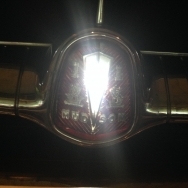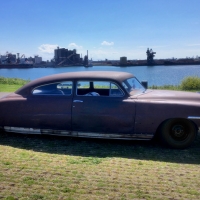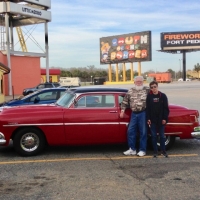Tesla powered Hudson
Comments
-
Looks like a lot of fun to me. And the beauty of the electric motor much like stream engines of the past, full torque at zero RPM. Crack the throttle and you have it all. Brian, I'm sure that's one of the things that makes driving your Tesla so much fun. Guess Henry Ford had a good idea back in the day when he designed the Model T to run on ethanol OR petroleum fuel. He prophesied ethanol as the fuel of the future based on the strength of American farmers. But that's another story.0
-
It is an intesting subject and I would love to see EVs take the place of ICE vehicles, but as said by others, EVs are still in early stage and not alot of car companies are willing to make the jump yet. If my memory serves me right, some of the very first cars in the world were electric, back in the late 1800s/ early 1900s. If we haven't decided to use petroleum fuel, maybe the EVs would have been in a more better spot, who knows.
I'll personnaly wait a couple of years, to see if EVs will be better or not and also gain more experience in car mechanic and try to make my 54 Super Wasp fully electric too.0 -
The picture album came up fine.Brian, the factory listed curb weight on a 53 4dr Hornet sedan was 3744 pounds.Hydramatic adds 148 lbs.How much do you think the electric Hornet will end up at?0
-
My target weight was net zero, and on Plan A, it looked like I was on track for that, because the stock engine weighs 700 lb, minus all of the other ICE-related components, fuel tank, radiator, hoses, clutch, engine accessories, etc. I estimated that would have pretty much offset the batteries and the Siemens motor (old plan).
At this point, on Plan C, with complete Tesla drivetrain/suspension (did I mention that I have now picked up a Tesla front suspension? No more Cadillac parts) it's tough to say... Losing both steel sub frames and 50s era suspension... Now going with aluminum suspension components and a trophy truck-style frame... I've got a 65 kWhr pack, which weighs almost 800 lb. Considering the cabling, connectors, and stuff, it would be optimistic to hope for a net reduction in weight, but I'm still hoping to be well under 4,000 lb total (a stock Tesla Model S weighs almost 5,000 lb)... I'll probably do some other weight-saving measures in the interior and with other component choices.
I'm as curious as you are, bro!
I've also toyed around with the idea of making the battery pack modular, so I could have say 40 kWhr permanently mounted in the car, which would be a range of probably over a hundred miles, and be able to add another 20 or 25 kWhr if I'm going to go farther that day.
My original plan from the mid-90s depended heavily upon a dinosaur-powered, or veggie oil-powered generator to extend the range. The dream plan was a small turbine, like they'd use in a auxiliary power unit APU from an airplane... Which could run on veggie oil, or CNG. A more realistic plan was going to be using a Harley V-Twin running on propane. It's relatively light engine, for the power, and air-cooled so that it save on water cooling weight and complication. It would also look pretty cool in front of the grille, which is where I was planning to mount it.
Back then, batteries were super crazy heavy and it was really difficult to get more than 30 or 40 mi of range before the car got too heavy. Now, the idea of a range extender is still a pretty good idea. I was thinking about mounting the entire unit on something that would use trailer hitch receivers on the front, or rear bumper. Could add it when needed, remove it when not. If it was propane-powered, then just use a barbecue tank. Probably have to build it to see whether it might really work or not, but this is the idea...0 -
Right on, Dan, I agree with your shop teacher completely...And just to be clear... I'm not trying to sell EVs to anyone, and I'm against mandating or eliminating ICE-powered cars completely. I strive to be super open-minded about everything, and I know that I have a serious bias about EVs. I finished school in '89, shortly before our first Gulf War over oil. There were rumors of a draft for that war. It didn't happen, but it was on the table. Remember when OPEC shut off the taps to the oil in the seventies? I vividly remember it. That's where my interest in electric cars started.I rode and raced motorcycles... What's one of the greatest compliments you can give an engine? "That power band is smooth, it pulls like an electric motor!" I like motors, roughly 80% of the energy put into a motor is turned into work. Only 15 to 20% of the energy put into an engine is turned into work. The rest is wasted as a friction and heat. Modern batteries are about 90% efficient...The amount of power stored relative to the weight is getting better and better (also called energy density). The cost per stored kilowatt hour is also coming down...and it's also getting better and better.I completely agree with you gents that we are nowhere near the tech that we need to be able to drive everything everywhere on electricity. But we only get there by moving along. During the years that the auto industry delayed the EV technology, (late '90s to early 2010s), The tech evolved very slowly... I'm *not a Tesla fanboy, but Tesla was the only group with the commitment to move the technology along... If it wasn't for Tesla, we'd probably still be back in the dark ages with Prius-level technology.Speaking of dark-ages technology, yeah I do agree that we still need hybrids to bridge the gaps. A Chevy Volt-style hybrid is far superior to Prius-style hybrid... The Chevy Volt is a battery-electric car with a dinosaur-powered generator on board. The Prius has an engine that's connected to the transmission along with a weak-ass motor-generator that needs help from the engine to move the car along. The plug-in Prius is kinda like the Volt, but it has a very tiny battery and can only go about 10 miles before it needs to be recharged, but Toyota makes it in small numbers and super expensive so that nobody buys it.I had a Chevy Volt for 3 years, and it was great because I had a 40 mi commute... I didn't put any gas into it for the first year. When the lease was up, my 53k miles were 92% on electricity.That said, the car had no Elvis. The Tesla is neat too, but it's more like Luke's X-Wing, haha. but there isn't any other modern car that I'd rather drive...and I certainly can't go back to a car I have to put dino juice into everyday (I hate gassing up my wife's Mommy Mobile)...Back to the subject (finally, haha), Teddy (my Hornet) is going to be my Millennium Falcon... my Serenity (for you Firefly fans)... all the good parts of modern tech, but with soul, and a Chuck Berry soundtrack.I'm also giving OPEC, and our own oil companies, two big MIDDLE fingers up...
 0
0 -
I drive A LOT, and Tesla's are neat.
BEST place for a P-R-I-U-S is on a wrecker headed to the junkyard! and a majority-(NOT ALL)- owners should TAKE A BUS!
JMHO...
0 -
Copy that!
 0
0 -
I retired from Seattle city light the publicly owned electricity provider for the Seattle area. Shortly after the Prius was available the city made them available for some of us for our daily work vehicle. Although they were hybrid, they were a significant improvement over the dodge omnis that we were previously driving especially if used in the downtown metropolitan areas. Twenty to 25 miles per day was a once every two weeks fill up. Would pure electric have been better? Certainly but in a hilly city like Seattle the Prius was a good start given the technology of the time0
-
Battery electric vehicles (BEVs, aka pure EVs) are perfect for fleet vehicles and commuters with predictable routes. Even back when the prius was introduced, 50mi of range in a BEV was dead easy, 75mi was no biggie, and 100mi was doable, but probably a bit pricey.
Even a prius would have been an upgrade to older Dodge Omnis, but I think that it wasn't the right tool for the job. But there may not have been a viable commercial BEV for a fleet that size.
0 -
Lithium-sulphur batteries could outperform Li-Ion, have lower environmental impact
Monash University researchers have developed a lithium-sulphur battery that can power a smartphone for 5 days, outperforming lithium-ion. The researchers have fabricated this battery, have patents and the interest of manufacturers. The group has funding for further research in 2020, saying that continued research into cars and grid use will continue.
The new battery technology is said to have a lower environmental impact than lithium-ion and lower manufacturing costs, while offering the potential to power a vehicle for 1000km (620 miles), or a smartphone for 5 days.
IBM's battery is sourced from sea water and out-performs lithium-ion
IBM Research is reporting that it has discovered a new battery chemistry that is free from heavy metals like nickel and cobalt and could potentially out-perform lithium-ion. IBM Research says that this chemistry has never been used in combination in a battery before and that the materials can be extracted from seawater.
The performance of the battery is promising, with IBM Research saying that it can out-perform lithium-ion in a number of different areas - it's cheaper to manufacture, it can charge faster than lithium-ion and can pack in both higher power and energy densities. All this is available in a battery with low flammability of the electrolytes.
IBM Research points out that these advantages will make its new battery technology suitable for electric vehicles, and it is working with Mercedes-Benz amongst others to develop this technology into a viable commercial battery.
And a lot more in the article------
0 -
I’m new here myself but find the people here so open minded and friendly and this topic only emphasizes that. On the H.A.M.B. everything should be as done until 1966 so there you will find much resistance to anything that’s not ‘period correct’.
I for one am also very interested in your topic. I’m from The Netherlands, a small country in Europe that’s very overcrowded and has had huge smog problems in the past and as much as I love all my classic American cars I’m also glad that every year the sky gets less brown from all the new technologies like EV’s.0 -
I've read a similar article a couple of weeks before, stating that Mercedes-Benz was working with Hydro-Quebec ( the one and only electricity provider in the French-Canadian province of Canada ) to create a better battery for vehicles. For sure some folks are trying to improve the batteries.Kdancy said:Lithium-sulphur batteries could outperform Li-Ion, have lower environmental impact
Monash University researchers have developed a lithium-sulphur battery that can power a smartphone for 5 days, outperforming lithium-ion. The researchers have fabricated this battery, have patents and the interest of manufacturers. The group has funding for further research in 2020, saying that continued research into cars and grid use will continue.
The new battery technology is said to have a lower environmental impact than lithium-ion and lower manufacturing costs, while offering the potential to power a vehicle for 1000km (620 miles), or a smartphone for 5 days.
IBM's battery is sourced from sea water and out-performs lithium-ion
IBM Research is reporting that it has discovered a new battery chemistry that is free from heavy metals like nickel and cobalt and could potentially out-perform lithium-ion. IBM Research says that this chemistry has never been used in combination in a battery before and that the materials can be extracted from seawater.
The performance of the battery is promising, with IBM Research saying that it can out-perform lithium-ion in a number of different areas - it's cheaper to manufacture, it can charge faster than lithium-ion and can pack in both higher power and energy densities. All this is available in a battery with low flammability of the electrolytes.
IBM Research points out that these advantages will make its new battery technology suitable for electric vehicles, and it is working with Mercedes-Benz amongst others to develop this technology into a viable commercial battery.
And a lot more in the article------
0 -
Battery technology is making huge advances right now.
0 -
Very cool build.0
-
Next up are supercapacitors. Ultra-fast charging!
https://www.designnews.com/batteryenergy-storage/lamborghini-and-mit-double-energy-density-super-capacitors/69392949962014
0 -
Then "Flux" capacitors!
0 -
1.21 Gigawatts, great Scott!
I don't mean to keep straying into politics, and away from the particulars of my Hudson project... but... many of these recent developments have been in the works for decades, but haven't had any momentum because the petroleum industry, and nearly all of the manufacturers, had been suppressing development of electric vehicles. Many new technologies are finally getting the push that they need to become reality because the electric car is now seen as possible, necessary, and inevitable to a wider group of people. Finally...haha.
So much of the necessary tech for EVs up until recently has been done on faith... Now, expect the hits to keep coming faster and faster because the development will be also driven by investors looking to get in on it now that it is inevitable.
Want to hear something funny? One of the first electric vehicles was made by a gent named Dr Ferdinand Porsche (yes, *that Porsche)... In 1896! In 1898, the good doctor put a gas engine and generator on it, inventing the gas/electric hybrid... In the 19th century!0 -
0
-
Love that!50C8DAN said: 0
0 -
I don't understand the comments about the Prius. I have had two of them and, they are great cars, I drive on average 35,000 - 38,000 miles per year. i drive the car for work and personal use. The first one I owned was a 2008 and I averaged 49-50 miles per gallon. The second one was a 2013 and I averaged 56 miles per gallon. I drive east coast roads and highways between Philadelphia, NJ and New York city. I was T-boned on the passenger side by a truck and the car proved to be safe in addition to getting great gas mileage. I also drive a 1940 Hudson Super six 2 door touring sedan,love my car.
0 -
GM and big oil really did a swell job killing street cars, public transportation, walkable cities and building malls, cul-de-sacs, square towns, broad roads and suburbs during the interbellum. Everything in the US is centered around gas cars. It did pave the way for some great cars between the twenties and mid sixties but the successful destruction of alternatives made them complacent too (no competition so no reason for good products) which drove people to Japanese cars. Now people are realizing what the damage is they are changing to once extinct alternatives like electric and good public transportation. Remember that the US was once built by and running the best public transportation in the world (street cars & trains).
Changing your Hudson to electric may be the best way to be able to drive it in the future. I still have the L6 but am secretly worried about the quality of our gas (E10 is now normal here) and what it will do to my Hudson. You don’t have that with electric 0
0 -
parkerm said:I don't understand the comments about the Prius...Apologies, ParkerM... I appreciate your positive experiences with Priuses, and that does put a different light on it, I did not mean to offend you. My feelings toward the Prius stem from Toyota's choices to use tiny batteries and tiny electric motor assist. Toyota's serial hybrid systems in Prius and Lexus vehicles were designed to keep the service center a profit center. A series hybrid, like Toyota's Synergi Drive, uses the gas engine to primarily power the car. Gas engines require maintenance. Toyota does not want to give that up. Honda doesn't either, but they're not trying to hide their greed in a supposedly green vehicle.High MPG Hondas achieve similar fuel efficiency in similar ways... Low weight, less aero drag, low power engines. The technology and complication in the Prius is substantial and unnecessary. Were your MPG figures calculated the old-fashioned way, miles driven divided by gallons used? Or did the car tell you what your mileage was? Priuses typically lie about those figures... It's been quite a scandal.If you compare the Prius and the Chevy Volt, it might show my position more clearly. A Prius is a gas-powered car with electrical assist. A Volt is an electric-powered car with gasoline assist. The Volt can drive about 40 miles without the gas engine ever turning on. Most people in our country drive 20 miles per day on average. I had a Chevy Volt for 3 years. I didn't put any gas into the car for the first year. A Prius cannot move more than a few feet, or a few miles per hour before the gas engine must turn on to assist. My Chevy didn't need any maintenance or have much wear on the gas engine in the 50,000 mi I drove the car. About 80% of the miles I drove were on battery power, the gas engine never turned on.I'm obviously not ticked off at you, ParkerM, or any Prius driver, and I really don't mean to pick on another man's car. I'm ticked off at Toyota, and the other car manufacturers for keeping the greed going, and holding back the progress on what we really need....efficient, safe, clean, fun(!) ways to travel. We need to be free from the proprietary fuels that are gasoline and diesel (Hydrogen-power is BS, too, don't fall for that trick).All of the original car makers know that electric cars require far less maintenance than engine driven cars, and they don't want to give up the service and spare parts. I was a car dealer for about 10 years, trying to get an electric car converting and modifying dealership sold going.I thousands of regular used cars keep the lights on and pay the bills. I was too early, my mistake. I ended up selling the dealership because it's tough to be profitable in the car business when you're a big old boy scout. After that time, I also worked at several OEM car dealerships, Acura, Mercedes, Mitsubishi. Maintenance, obsolescence, and changing styles, are super important to car manufacturers. Plus, most car manufacturers are cross pollinated with oil manufacturers. Their interests lie together... Sell more cars, sell more fuel for the cars. Electric cars disrupt that.I'm no fanboy, but I have great respect for what Elon Musk and Tesla have done. They have proven that electric cars can be possible, fun, sexy, and pretty darn close to being profitable. If it wasn't for Tesla, we still wouldn't have any real electric cars from any of the original manufacturers.Once again, I've strayed pretty far from the point, haha. My original dream in the mid-'90s, was to power my hotrod, a '53 Chevy, at the time, with sunshine. I was a child in the '70s, and my three core memories from that time were studying the effects of pollution in elementary school, Skylab... NASA's solar-powered space station, and the Arab oil embargo. Solar panels were supposed to power everything by the 21st century, haha...
Later, after school, I wanted to run my vintage car dreams with electric motors, powered by solar cells, instead of dead dinosaur juice from OPEC. That's the long and short of it. I don't hate gas powered cars, on the contrary, I still love them, I've built several engines for my hot rods over the years, including a big block Chevy in the kitchen of my first apartment. I also love horses, and love riding horses, but I don't ride one every day to work because it doesn't make sense to me. It wouldn't hassle anybody who did want to ride a horse to work. Live and let live, that's my philosophy.My Hudson is coming along, slow but sure, I'm bummed that I have to farm out some of the work, because I'm still getting my home shop together after a bear of a move, but I don't want to wait on progress until I do. We'll get it together, and I think it'll be really awesome.0 -
Rhodora said:GM and big oil really did a swell job killing street cars, public transportation, walkable cities and building malls, cul-de-sacs, square towns, broad roads and suburbs during the interbellum. Everything in the US is centered around gas cars. It did pave the way for some great cars between the twenties and mid sixties but the successful destruction of alternatives made them complacent too (no competition so no reason for good products) which drove people to Japanese cars. Now people are realizing what the damage is they are changing to once extinct alternatives like electric and good public transportation. Remember that the US was once built by and running the best public transportation in the world (street cars & trains).
Changing your Hudson to electric may be the best way to be able to drive it in the future. I still have the L6 but am secretly worried about the quality of our gas (E10 is now normal here) and what it will do to my Hudson. You don’t have that with electric
That is a good point about the quality of gas. We forget that the gas we buy now is not the same gas that was sold when these Hudson's were manufactured.
0 -
Hi BrianV53. I'm was not offended by your comments, just a little confused based on my personal experience.I actually agree with most, if not all of your points. In the first paragraph you speak about Toyota using tiny batteries and tiny gas engines so that design became a profit center for them. My analogy would be the American car makers in the 60's & 70's wanted to keep status quo in the way they manufactured cars and they did not feel it necessary to compete with Japanese car makers and due to their short sighted vision gave up the American car market to the Japanese.I would love to see electric motors power our cars. It would not be the same as our old Hudson's, but it would be less expensive to maintain and better for our planet due to the emission's. It seems to me that we may all need to convert our classic cars sometime in the future to electric. The power plant won't be the same, but we could still drive a classic.You are absolutely correct about the oil companies being the driving force in America regarding mass transportation (No high speed trains from the east coast to Chicago, LA, Dallas etc.) locally and nationally. LA is so dependent on highways because the oil companies and the car companies lobbied to have Freeways built instead of mass transit. That goes back to the 1930's. It makes no sense for a city with such a large foot print as Los Angeles has to have a well devel NYC has a subway system supplemented with a bus system that works pretty well to move millions of people between the five boroughs on a daily basis.Anyway, I really was not upset by your comments, just mystified.0
-
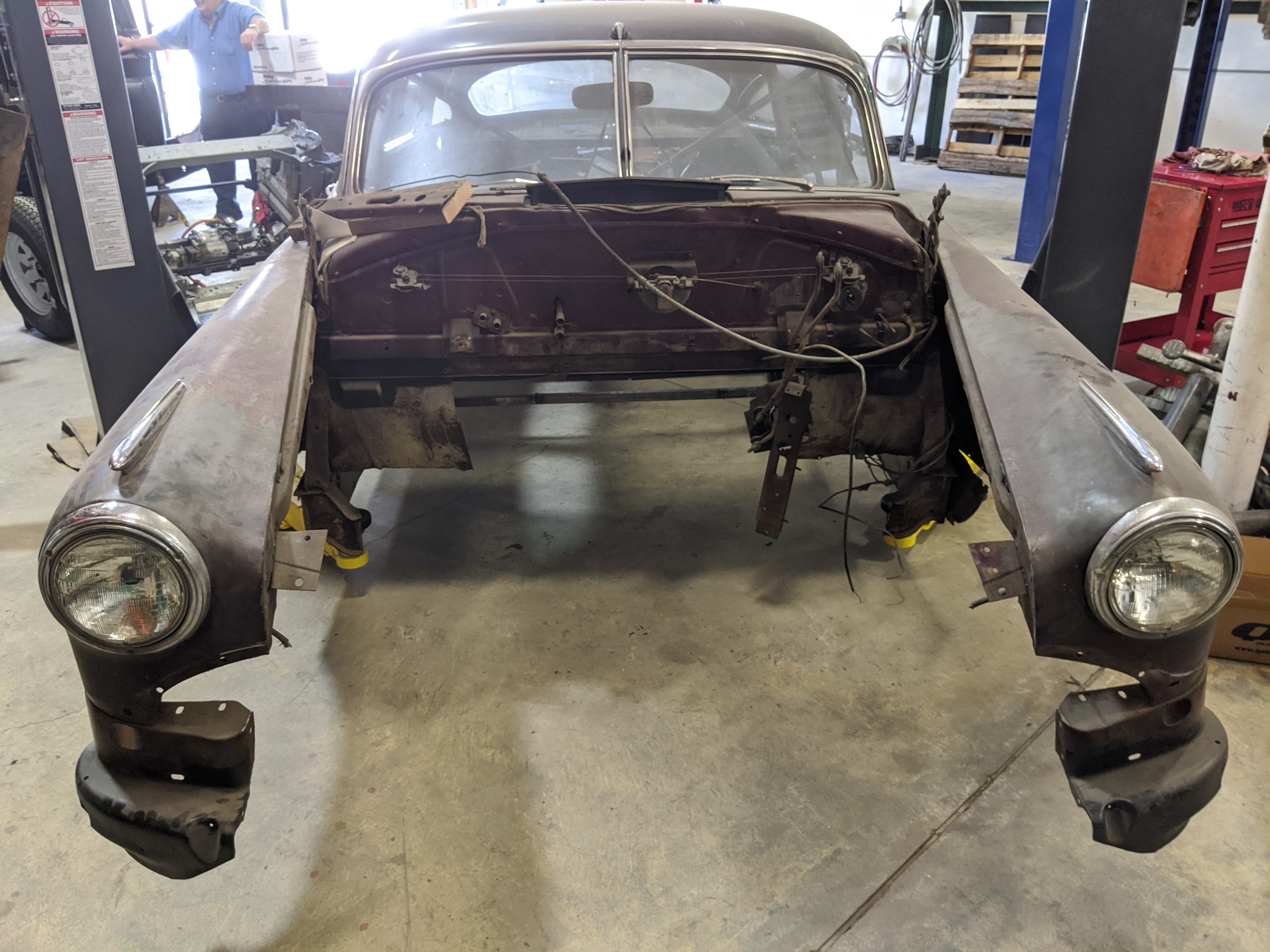
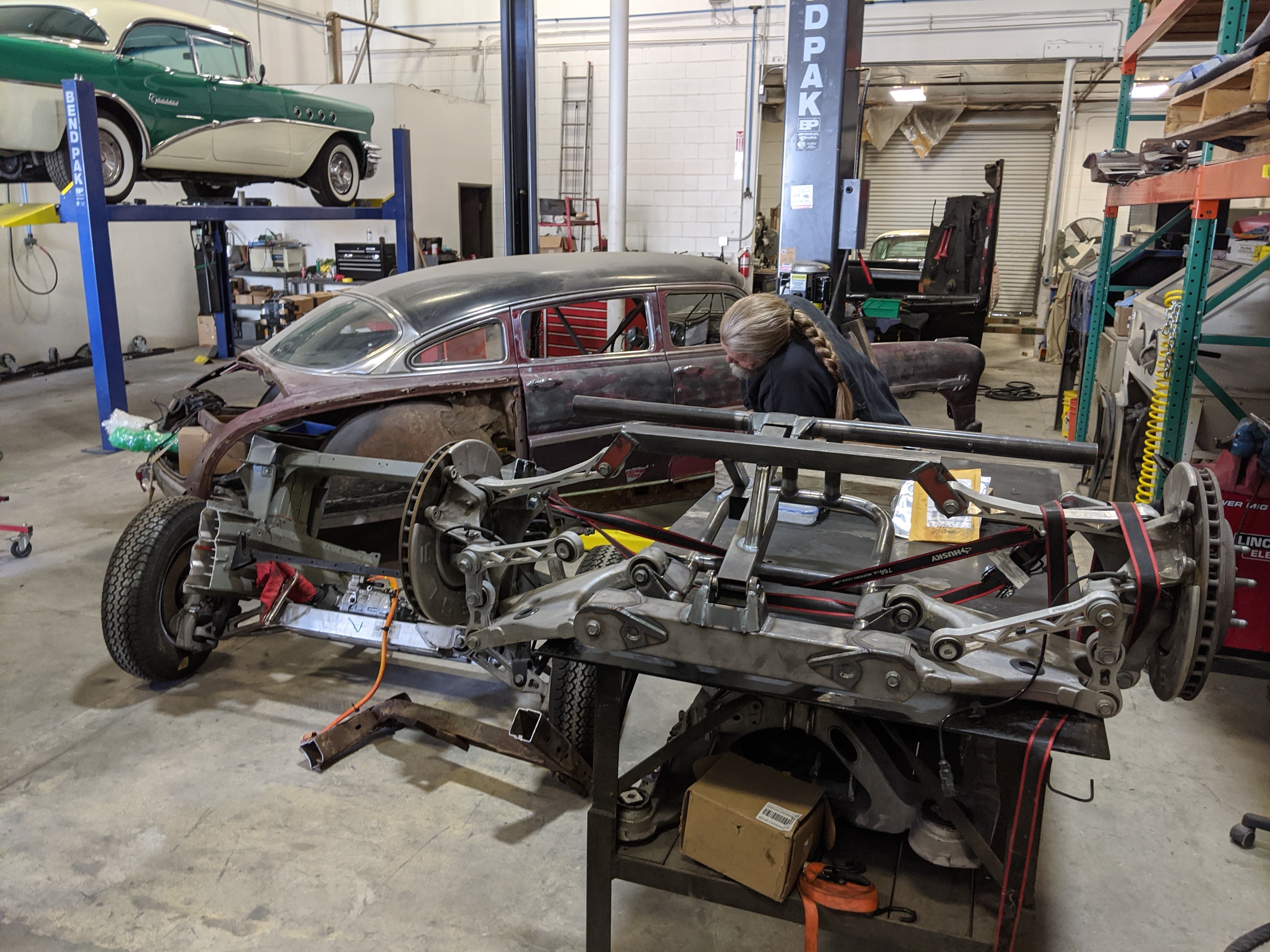
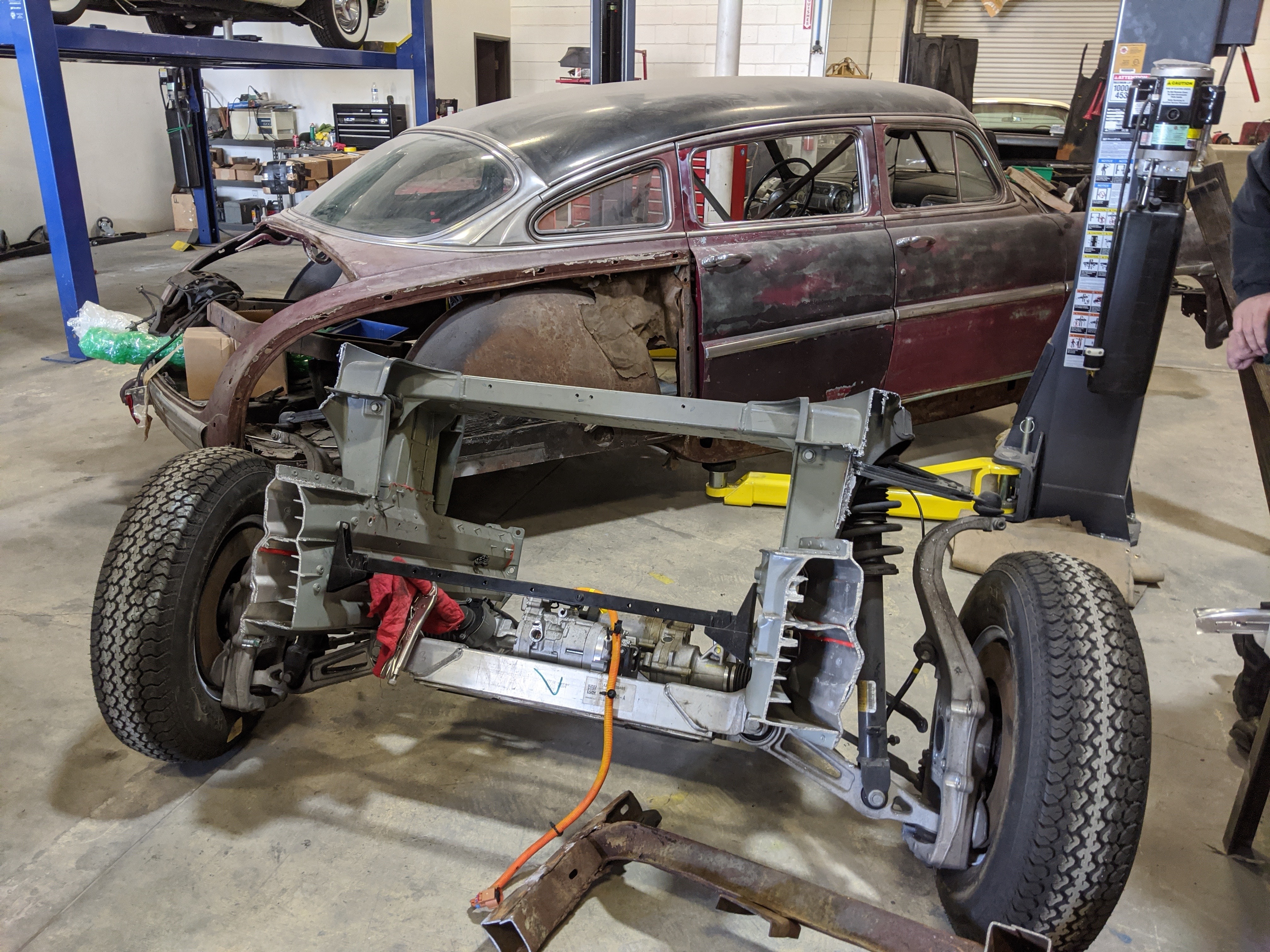
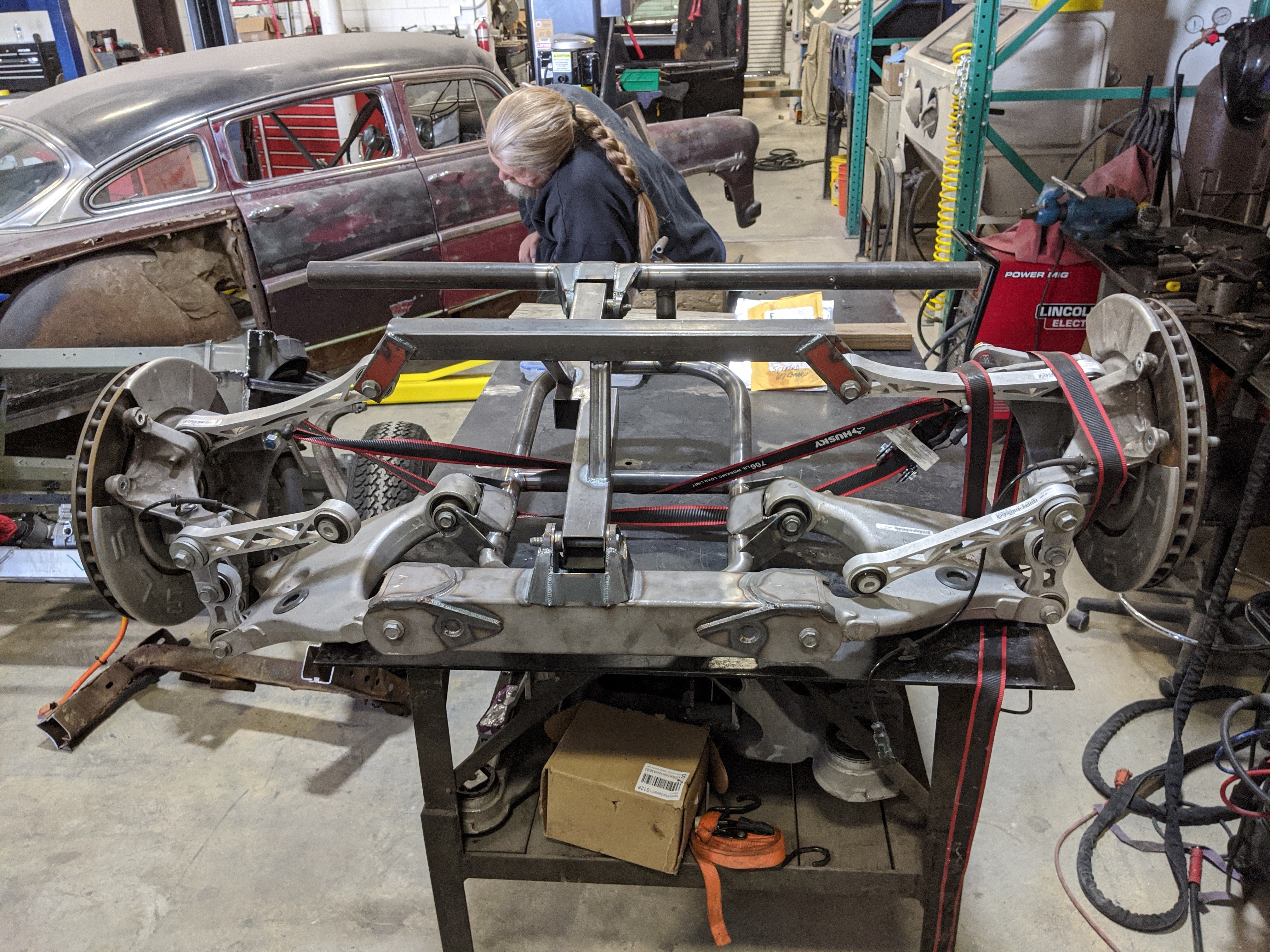
Here's the state of Teddy now... Switched from Plan B, a Cadillac frame, to a custom perimeter frame that uses the base of the ingenious Hudson semi-unibody design. The perimeter structure will use the Hornet's body as a stressed member to tie-in the new Tesla front and rear suspension assemblies. The rear assembly needs to be narrowed to fit the tires between the skirts of the Hornet. It's on the table in these photos with ratchet straps, and some of the new subframe parts.
The front suspension assembly is on the floor and has wheels on it. Oddly enough, those are old Chevy wheels, but they would never fit because they wouldn't make it over the brake calipers. Hopefully, it won't need to be narrowed. I am going to have to run larger than stock wheels, probably 18 or 19 inch wheels, but I'm going to make them look like original wheels with the original hubcap. The rears probably won't even be seen. I'm going to try to use the original air struts, so I can have some ride height adjustability. My design philosophy is to stay true to the original style. At a glance, I don't want the car to deviate from the original beauty of the Hudson Stepdown. I'm sure I will take liberties in the interior, but it'll all be period appropriate.
The Tesla motor puts down about 300hp and 300ftlb of torque. I'm using the "normal" Tesla rear motor. The Performance Model motor puts out more than double, but is larger, heavier, and a little less efficient. This is my family cruiser, so I figure 3x stock performance is great, haha.
I'm as curious as you gentlefolk... This is not an exact science, there is a fair bit of fumbling around in the dark, but I love these kinds of challenges. The upshot is that we will end up with a beautiful Hudson, one that might have never been on the road again.
0 -
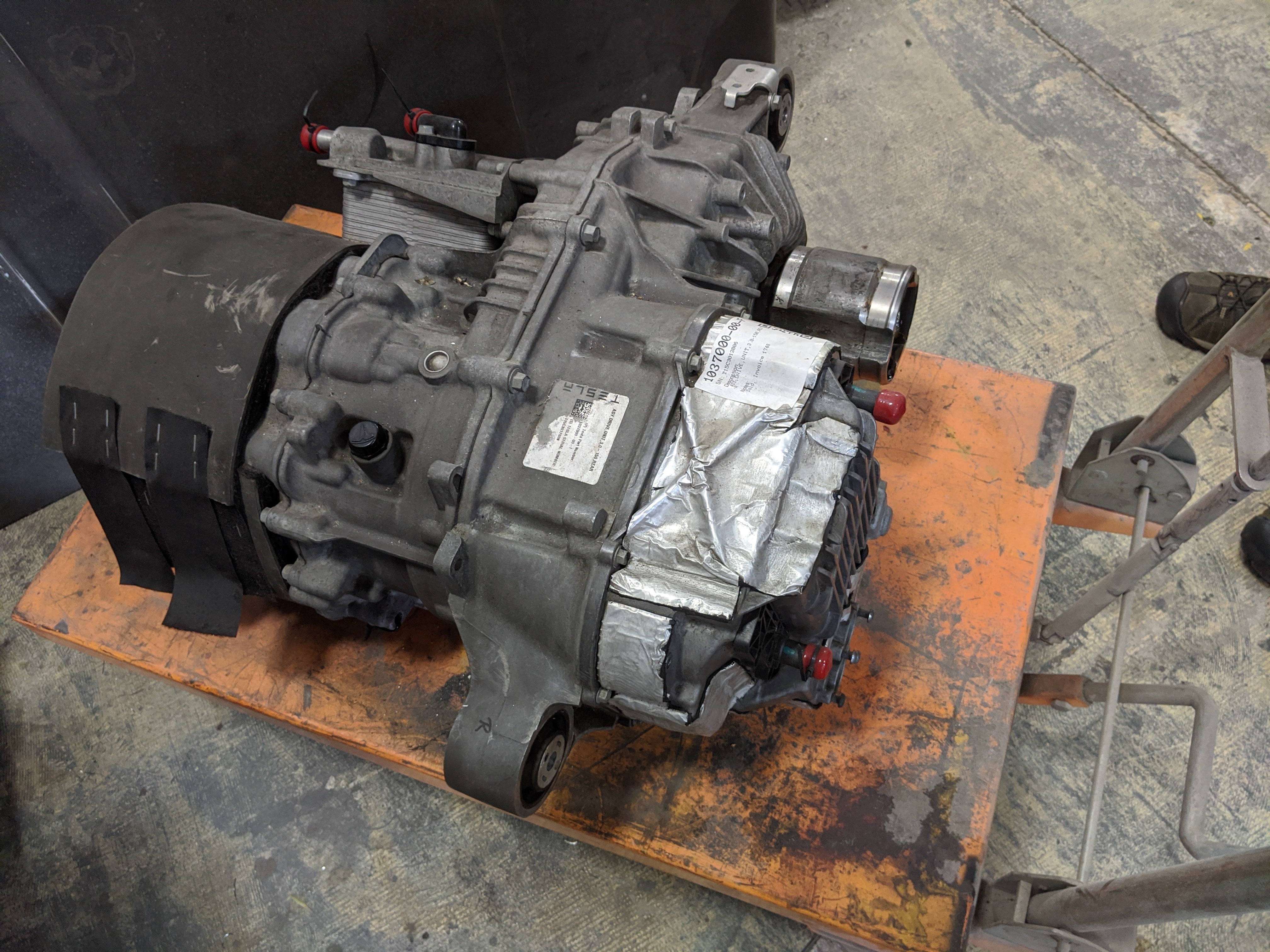
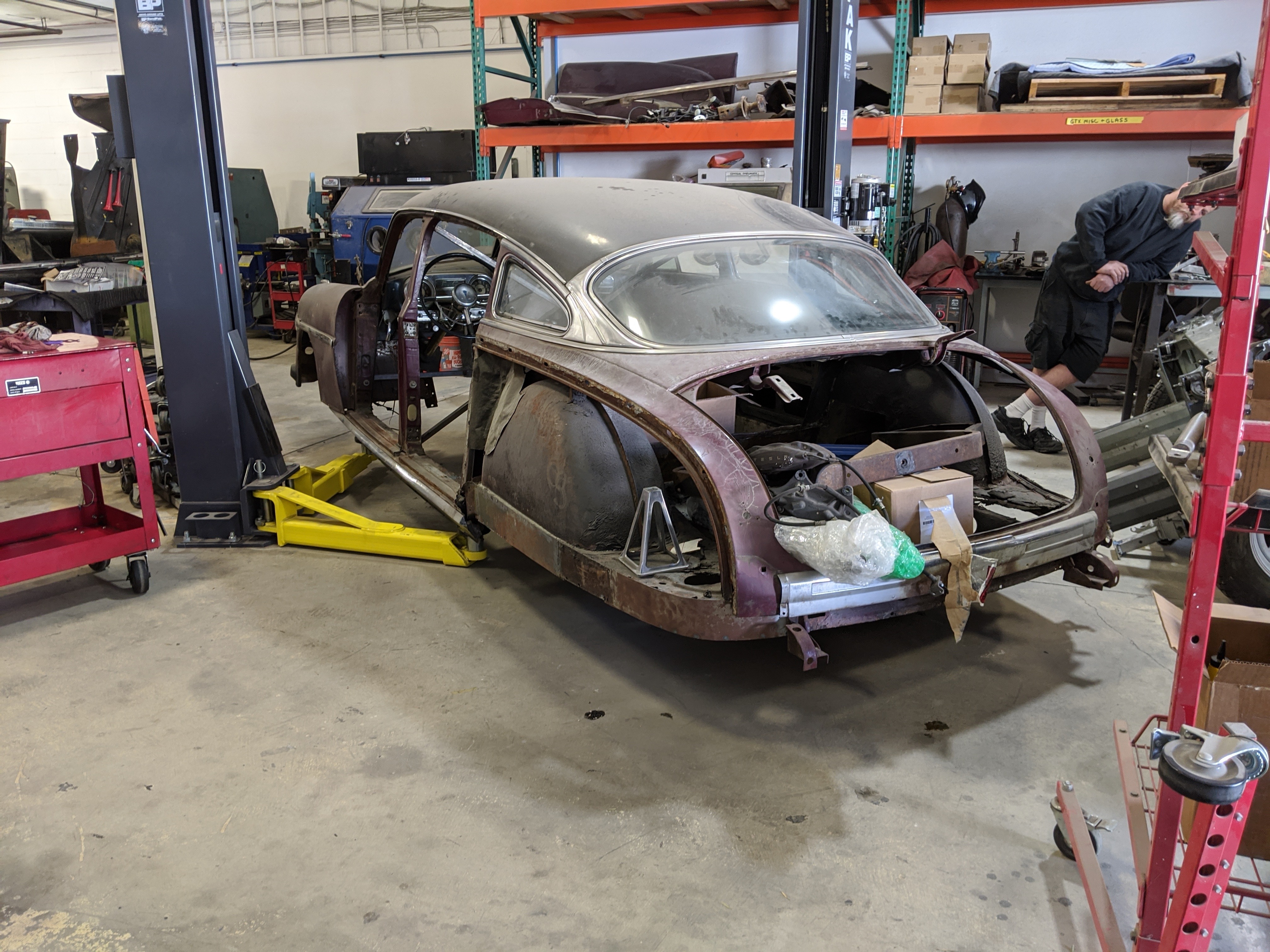
0 -
Most exciting to watch the progress!!
0 -
Thank you for your insight and kind words! I started down this path in the mid-90s after the first Gulf War. Since I was still a relatively young man, my thought was to convert vintage cars and hot rods. I was good home mechanic, but many of my friends were struggling to just to keep their cars running.Rhodora said:Changing your Hudson to electric may be the best way to be able to drive it in the future...
Some cars are all about the engine, but most cool vintage cars are about the style and the rest of car, the engine is mostly there to move the car.
I had a roommate with a Studebaker, another buddy with a Nash Metropolitan, I owned a Checker Marathon, as well as Chevy panel truck... All of these vehicles would have benefited from electric power. I'm not suggesting that every car be turned to electric, but ones that are good for transportation, would be awesome.
I'd also planned to go into the conversion business, and convert modern cars seamlessly to electric power. I figured 150 mi range would be good for most commuters and runabouts, and who wouldn't want an electric Mustang, or a Mini Cooper, or a Chrysler minivan, that had clean electric power?
My philosophy is, the less oil we buy from OPEC, the less intervention of the government in Middle East affairs, and the more control we have over our own energy, the better...along with cleaner air and water. Bonus!0 -
All good reasons for a conversion0
-
Whoa, that looks both scary and good! Very curious of how it will turn out!
Here in The Netherlands people who love American classic cars think that it needs to have a big block V8. So line sixes are thrown out as boat anchors, especially in the expensive Mopar niche (which is all the more wasteful as those slant sixes are wonderful engines). So some people got offended when I’d say “If I ever got rich I’d swap my engine for an electric motor”.
I’d still do it to both my classics. I love the Buick straight eight and Dynaflow. It’s beautiful to see. But it’s not efficient and takes so much care to maintain. It just doesn’t make sense. And I have two left hands, so tinkering on cars I only do on the simplest parts. I just wanna drive. As much as I can. With the Buick this means only a few hundred miles per year. It costs me $0,80 per mile in fuel alone.
The Hudson is about three times as efficient so that I drive much more (and it also handles 3 times better). I’m sticking with the original stovebolt for a while with the Hudson.
Ok this is the last I will sidetrack in your topic 0
0
Categories
- 37K All Categories
- 117 Hudson 1916 - 1929
- 21 Upcoming Events
- 96 Essex Super 6
- 28.6K HUDSON
- 576 "How To" - Skills, mechanical and other wise
- 995 Street Rods
- 151 American Motors
- 181 The Flathead Forum
- 49 Manuals, etc,.
- 78 Hudson 8
- 44 FORUM - Instructions and Tips on using the forum
- 2.8K CLASSIFIEDS
- 609 Vehicles
- 2.2K Parts & Pieces
- 78 Literature & Memorabilia
- Hudson 1916 - 1929 Yahoo Groups Archived Photos
